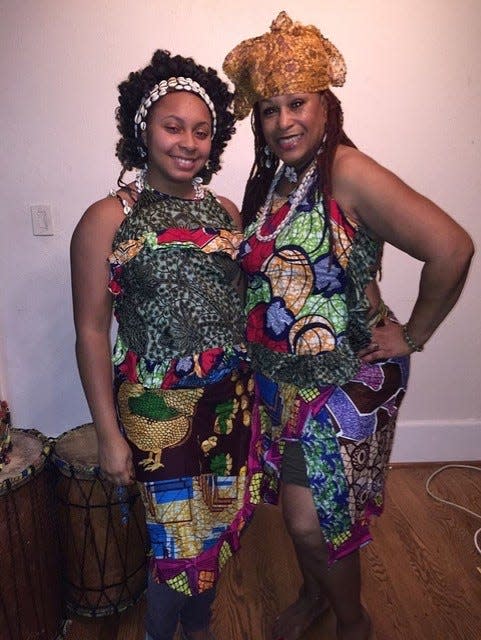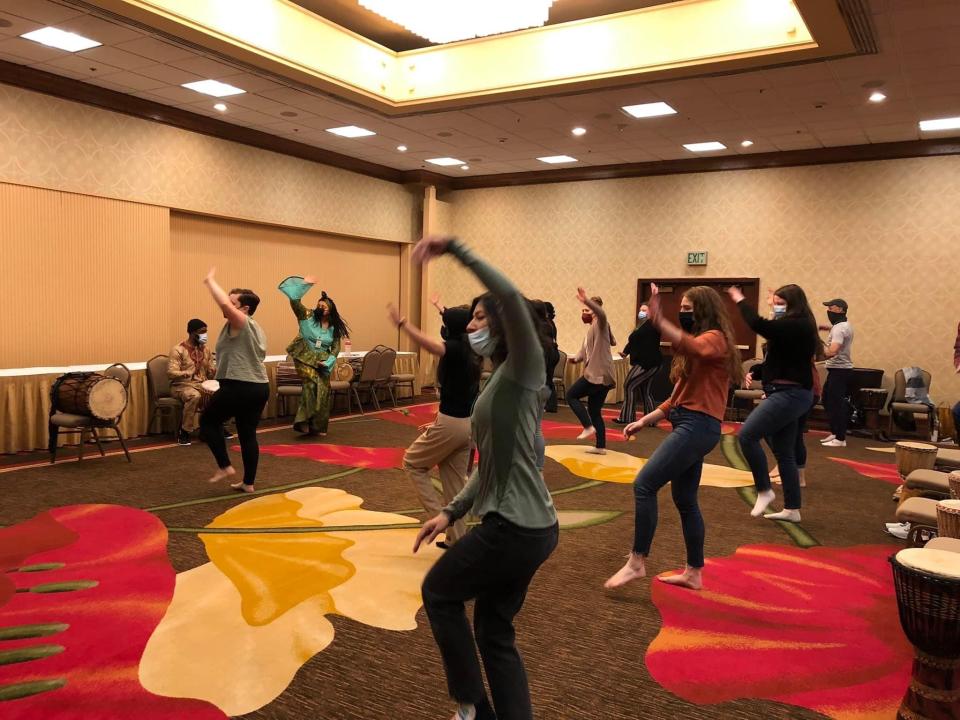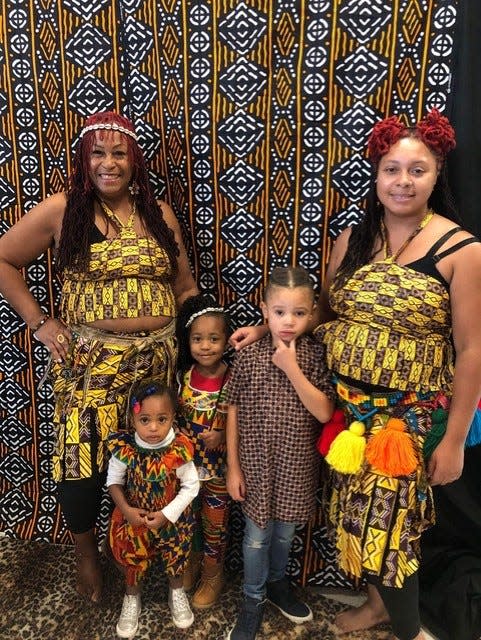Bremerton dance teacher, social worker selected for traditional art apprenticeship program
When Nailah Bulley was two years old, her mother knew that she was a performer. Bulley would cry when she couldn’t be on stage, so her mother decided to make her performance costumes and do up her hair since she seemed to be a natural already.
Now Bulley, a Bremerton resident, and her mother, Afua Kouyate, have been selected as an apprentice and master artist pairing in the Center for Washington Cultural Traditions' 2023-24 Heritage Arts Apprenticeship Program. This flagship program for the center is co-sponsored by Humanities Washington and ArtsWA to preserve traditional arts, crafts and skills that are at risk of being lost, by funding their installation into the next generation of artists.
One pairing among 15 in the program’s sixth cohort, Bulley, 32, and Kouyate, 65, will spend at least 100 hours together in one-on-one time throughout a year to intensively study and practice traditional and authentic West African dance and its folkloric preservation.
“African dance is a global folkloric method of communicating culture – it's a way of life,” Kouyate, who lives in Seattle, said. “When we look at African dance, we're looking at an intergenerational movement and a movement of therapeutic engagement that keeps a community healthy.”

A bond between mother, daughter and dance
Kouyate views her life in five phases. “Identity” saw her examine the importance of culture to her as an adolescent, “recruitment” marked her mission to teach her peers about African culture and dance as a teenager, in “engagement” she traveled worldwide to learn from cultural experts, “implementation” was substantiated by Kouyate’s co-founding of her dance company, bringing her to her final phase, “preservation.”
“When we look at this apprenticeship program that we're doing with Humanities Washington, it's really going to highlight how we sustain African dance in Rainier Valley,” where Kouyate and her company, Adefua, are based, Kouyate said. “I truly believe that arts and culture is a therapeutic vehicle for every person and I'm really honored that my children have taken a front-line step into helping this vision manifest.”
Pairings in the apprenticeship program aren’t selected by the Center for Washington Cultural Traditions, said director Thomas Grant Anderson. The master and apprentice usually had an established connection and it’s not uncommon that the program will see a familial pair like Bulley and Kouyate.
“I am the branch off the tree of Afua,” Bulley said. “She's my mother and it's been a big pillar in my life to be involved with arts and culture.”
Apprentices like Bulley are not students, Anderson said, as apprentices already demonstrate a deep commitment and skill in their particular art form just as they exhibit an intense pre-existing relationship with their mentor.
“Since I was a little tot, I have grown and embraced learning music, song, and dance pretty much every day within my everyday life,” Bulley said. At nine years old, she acted as musical director for Adefua’s African Harvest production.
“Being a foster parent, Nailah always had to share her mom with community and with other children in the home,” Kouyate said. “She always took a very peaceful route into how she shared her mom, and so one thing that keeps us bonded is our performing and teaching together.”
Over their apprenticeship, the pair will meet three hours once every week. Kouyate will lead Bulley through an intense curriculum that’ll start with researching over 38 years of videotapes and documented performances, workshops and interviews on West African dance. After studying in libraries, embarking on field trips across the country to meet with instructors, and documenting choreography from guest artists, the pair will then discuss at length what they will take from their research into a production on stage.
Then, the duo will identify costuming, create marketing and rehearse for a final free performance at the Langston Hughes Performing Arts Center in Seattle on February 24 of next year. The performance will be followed by a time to answer questions from the audience.

Intentional investment into cultural preservation
Each artist in the program will be given an honorarium for their work – $4,000 for the master, $1,000 for the apprentice and $1,000 for traveling and materials.
The honorarium “is a recognition that these things are important, professional, dedicated skills, they are much more than hobbies, they are much more than pastimes,” Anderson said. “In so many ways, the American experience has been predicated on this idea that work is something that you do to survive and I think that we too often forget that work is something that you can love, but that doesn't make it not worth being paid for.”
When the work of artists is to pass down cultural and traditional skills, the stakes are raised.
“If you look at it from a deficit or risk standpoint, there's a million things that interfere with cultural traditions being practiced and that is the squeeze of late capitalism on things that don't produce a bottom-line dollar,” Anderson said. “We're working against historical wrongs. When we're talking about West African dance, there's no two ways about it: we're talking about a cultural legacy of enslaved people who were not brought to this continent of their own free will, so where do we start on righting those wrongs?”

For artists like Bulley and Kouyate, the support and intentionality of the apprenticeship is an effective and efficient avenue for practicing and preserving traditional skills.
“We're both very busy people, so just having that designated time to learn and appreciate some of the things that are being passed down is important,” Bulley said. “And it's more of a way to do it publicly. People don't really understand or get to see behind the scenes of the passing of knowledge, they just get to kind of see a final project.”
“It adds the resilience of our work,” Kouyate said. “We deserve to take our time and go back and research, we deserve to have that open opportunity to better understand our gifts. It's a good choice of resources (for funders) because instead of just paying for a performance, they're paying for us to have some real quality time in passing this on because the way we pass it on, it's going to be really important that we're thorough.”
Passing the torch
Bulley hopes to identify values and practices she’ll learn from her mother through the apprenticeship that she’ll be able to apply to her own work.
Throughout the process, she will be “taking teaching cues and lessons, different ways to interact with different audiences, different ways to connect with different businesses or partnerships, different ways to make connections, networking and picking up whatever I can with my little sponge and using it, applying it to my classes, my day-to-day work, my business, my programming and just becoming bigger and better,” Bulley said.
Bulley owns Oni Arts Collective, where she works to create programming for people to come together through culture, song, dance, history and collaboration. She was also one recipient of King County’s $25 million in grants given to community organizations that address racism as a public health crisis. She’ll be providing free classes for parents and children zero to four-years-old to begin their path towards learning West African dance though learning rhythm, songs and small movements.
“I strongly believe that it's our duty to reach back and learn and educate each other through culture,” Bulley said. “We'll have a better understanding of each other as a humanity if we're able to see the roots of each other.”
It’s not uncommon for apprentices to re-enter the program as master artists, Anderson said. And masters like Kouyate even re-enter to teach apprentices year after year. The center works to sustain funding for these consistent artists and even expand their reach into every county in Washington State to work with a diverse catalog of artists.
“I would like for people to see the joy in arts and culture within families, I would love for people to feel the richness of synergies that happen when communities come together,” Kouyate said. “I would love for daughters and moms and sons and fathers to drum and dance together.”
Bulley also has three children of her own, who she instills traditional skills and cultural values into.
“My kids love to dance, they love to drum, they love to be involved,” Bulley said. “I keep them around it just as much as I was around it, and then that way we're able to continue the legacy of preservation and we'll be able to take it through the next generations as well.”
Bulley’s six-year-old son loves to speak in front of the crowd, singing and lead call and response. Her four-year-old is Bulley’s “practical business-lady,” and her two-year-old daughter loves to be front and center on stage. She’ll cry if she can’t join the performance.
(Edit: Thomas Grant Anderson's name was spelled incorrectly)
This article originally appeared on Kitsap Sun: Bremerton woman selected for Washington Heritage Arts Apprenticeship

